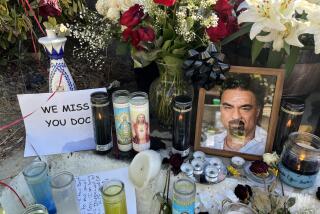Anti-Apartheid Activist, Wife Slain in S. Africa
- Share via
JOHANNESBURG, South Africa — Masked gunmen killed a prominent black physician and his wife, both leading anti-apartheid activists, the South African government’s Bureau for Information reported Tuesday.
The killings appeared to be the latest in a two-year series of political assassinations, none of which have been solved.
According to the bureau, Dr. Fabian Ribeiro and his wife, Florence, both in their 50s, were gunned down Monday evening at the kitchen door of their house in the black ghetto township of Mamelodi, outside the South African capital of Pretoria.
The bureau said the gunmen were black and armed with .45-caliber revolvers, but neighbors who witnessed the shooting--and gave chase until they were fired upon--said the men were white and wore knitted ski masks.
Detained Several Times
A year ago, after he was burned out of his house by right-wing vigilantes, Ribeiro said in an interview: “We have entered an era of political murders and outright assassinations, with death squads and a secret war being waged by the government against its opponents. . . . Once such violence is begun, the people will only be able to respond with violence.”
Ribeiro was detained by security police several times, most recently in June, when President Pieter W. Botha declared a national state of emergency. On that occasion, he was held in solitary confinement without charge for more than two months.
He was tried on charges of terrorism in 1979--accused of helping young blacks to leave South Africa and join the African National Congress, the principal guerrilla group fighting minority white rule here. He was acquitted.
Known as “the people’s doctor” for his long involvement in the anti-apartheid movement, Ribeiro treated many of the casualties from the continuing political unrest in Mamelodi, even though, he said, he had been warned by security police that he risked renewed detention by doing so.
“It is sad to lose a gallant leader like him during these difficult times,” Mpendulo Khumalo, an official of the Mamelodi Civic Assn., said Tuesday. “But his death will not deter the determination of the people to bring the apartheid system to its knees.”
Latest in Series of Attacks
Ribeiro’s wife was the sister-in-law of the late Robert Sobukwe, president of the Pan Africanist Congress of Azania, the other major guerrilla group. The legacy of Sobukwe, who died in 1978, remains a major influence in black politics. The Ribeiros had four children and several grandchildren, one of whom was with them when they were gunned down but was not harmed.
The Ribeiros were the latest of more than 30 leading anti-apartheid activists who have been assassinated or abducted in the political violence of the past 27 months. The government has repeatedly and vehemently denied any involvement in the deaths, but police have yet to solve a single case.
“It is a known fact that those responsible for the death of Dr. Ribeiro and his wife will never be brought to book,” Khumalo, the civic association official, said. “We appeal to residents to be vigilant at all times and to form street defense committees. Otherwise, we will be slaughtered like sheep.”
Compared to Lebanon
The Rev. Nico Smith, a white minister who recently moved into Mamelodi and lives a few doors away from the Ribeiro house, commented: “There is a low-profile civil war going on here and in the other black townships of this country. It’s getting like Lebanon here, with open shooting on the streets.
“This is blamed on ‘black-on-black’ violence, but it’s really the unjust system that the people are opposing and that others are intent on maintaining, whatever the cost in human lives.”
Two more blacks were killed in unrest elsewhere, according to the Bureau for Information, the sole authorized source of news on the continuing political violence here. In Soweto, the sprawling black satellite city outside Johannesburg, a suspected police informant was dragged from his home by a mob of 200 youths, stoned and then burned to death. The charred corpse of another man was found in a black township outside Uitenhage, in eastern Cape province.
In Pretoria, the new minister of law and order, Adriaan Vlok, told South African journalists that the police will act to prevent black activists from enforcing their announced boycott of white stores in the weeks before Christmas.
Without specifying police plans, Vlok replied, “You could not have put it better,” when asked whether the boycott organizers “had better watch out.”
In what appeared to be a related development, the police, using their powers under the state of emergency, formally prohibited Azhar Cachalia, the treasurer of the United Democratic Front, a coalition of 700 anti-apartheid groups, from taking part in its activities or participating in any of its campaigns.
“I view this as part of a systematic campaign of harassment directed at activists of the United Democratic Front,” Cachalia, a lawyer, said after being served with the police order. “The purpose is to try to emasculate the UDF without having to ban it.”
More to Read
Sign up for Essential California
The most important California stories and recommendations in your inbox every morning.
You may occasionally receive promotional content from the Los Angeles Times.













